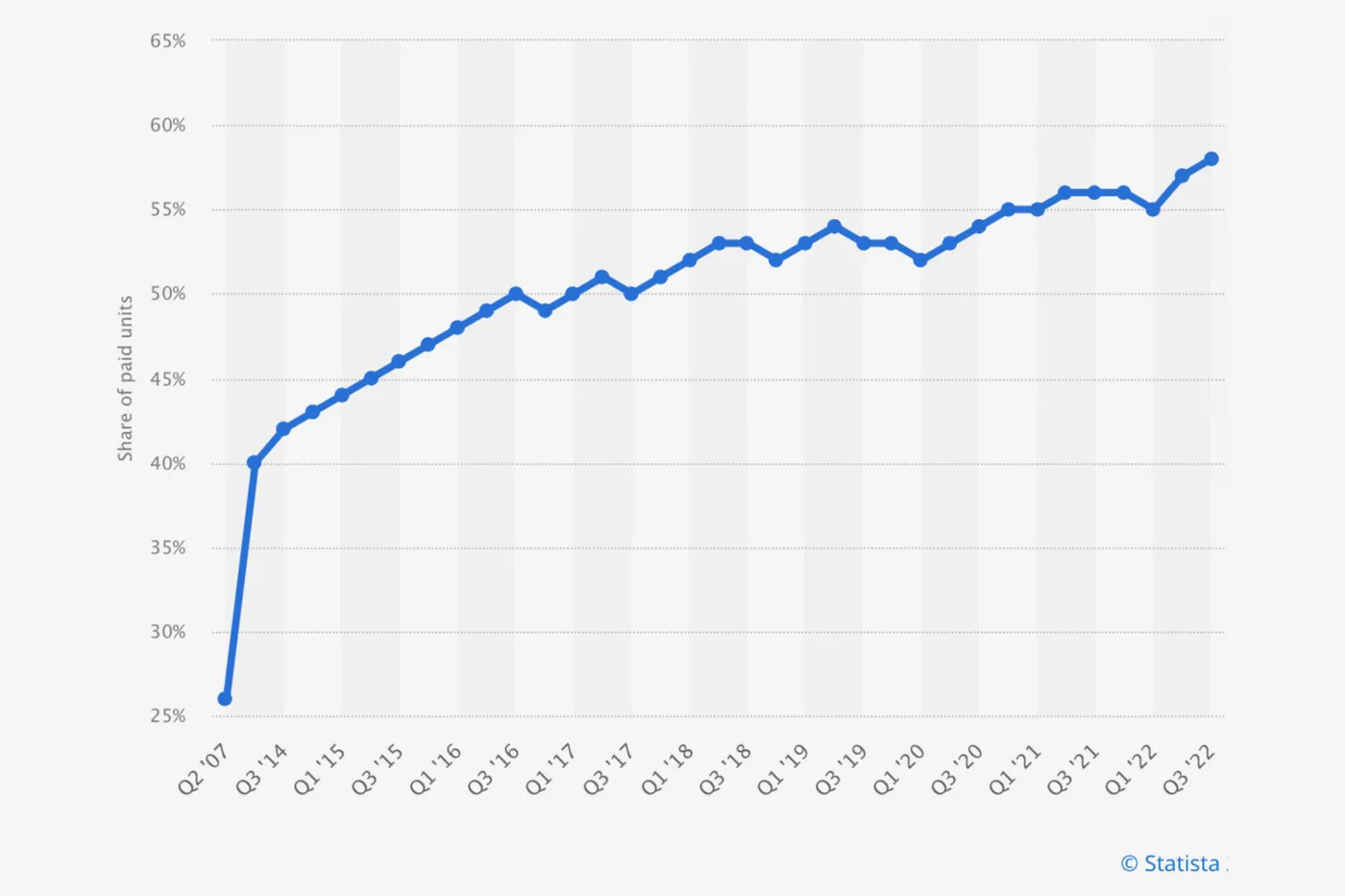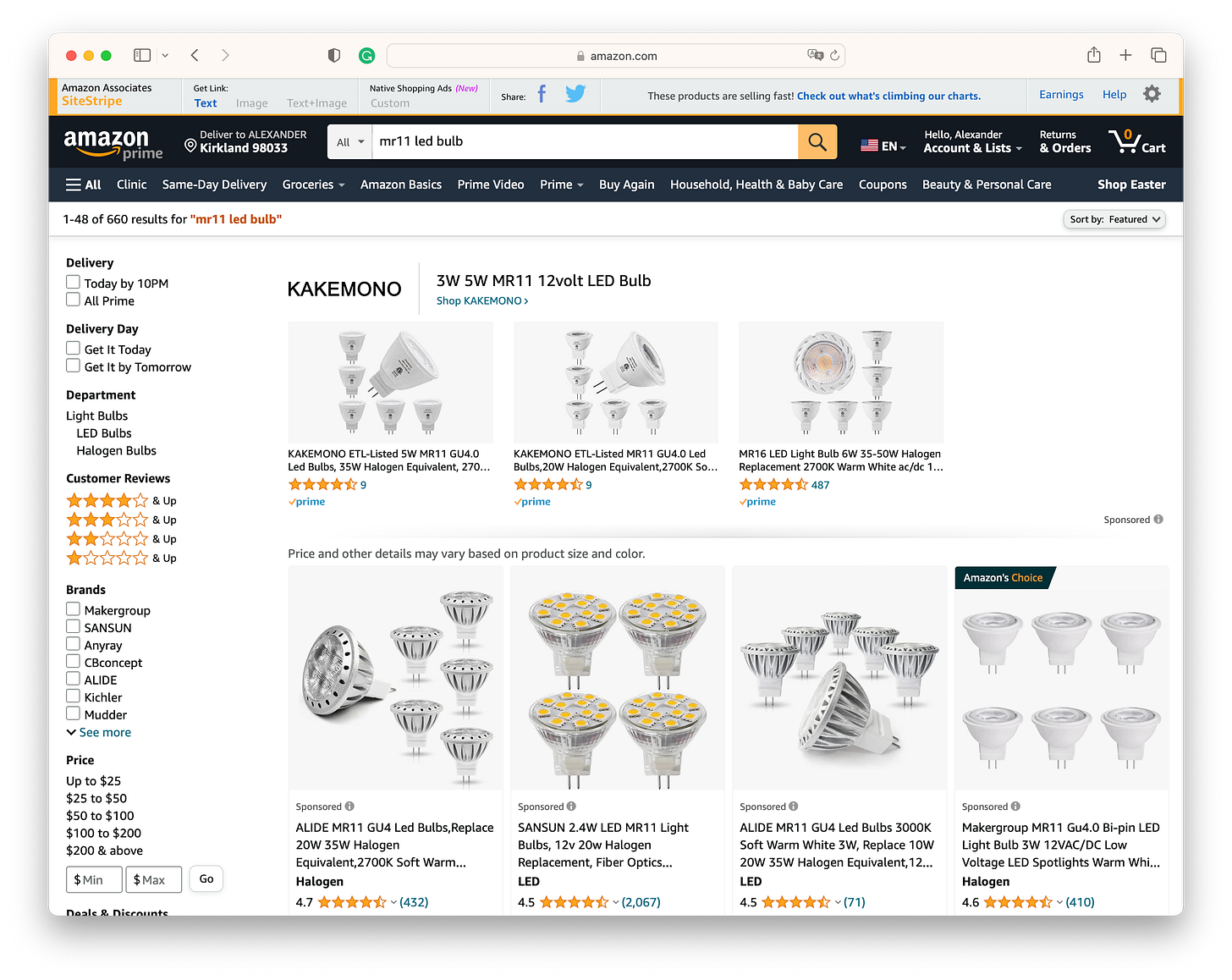How many Amazons does it take to change a lightbulb?
Has Amazon lost its legendary focus on customers?
A lightbulb went out in my kitchen this past weekend.
Ordinarily, this would not warrant even a quick tweet, much less a full newsletter!
But this was no ordinary light bulb. It was an Amazon light bulb. Therein lies the rub.
The light bulb that died was from my fourth purchase of light bulbs from Amazon in the past six months. Each time, I've received a substandard, low-quality light bulb that burned out within days or weeks, even though I only bought bulbs with high reviews.
It wasn't just light bulbs, either. I've chewed through two sets of drinking glasses from Amazon in the last year. Even the branded ones (Mikasa) died quickly--counterfeits, perhaps? Ironically, I still have the drinking glasses from my first apartment during my university years (we'll skip how many decades ago that was!). The cheap stuff I could afford in college is turning out to be more durable than what I can buy on Amazon these days.
I'm not alone in this problem. New York magazine had an excellent article on this phenomenon recently: https://nymag.com/intelligencer/2023/01/why-does-it-feel-like-amazon-is-making-itself-worse.html. If you've been frustrated with Amazon purchases recently, the article is a worthy read. One of the key highlights--third-party sellers now account for over half of the volume of Amazon e-commerce sales.
This, by and of itself, is not such a big deal. Amazon largely does a great job of providing the logistics and integrating into features like Amazon Prime two-day delivery. And on the benefits side, it provides Amazon with millions of niche products that one can't find in traditional stores. If you've ever needed an obscure part to repair camping gear or the like, Amazon can be a savior!
The challenge is sponsored placement as well as open reviews and rankings. These features allow unscrupulous and aggressive merchants to game the system, getting visibility and seemingly high ratings on substandard products. Returning to my light bulb dilemma, here is the first page of a light bulb search.
Who are these brands? As I run my own startup companies, I'm not opposed to trying something new from a startup! How do I know if these brands are legitimate smaller companies offering a superior product or scammy merchants gaming the system? Clearly, the light bulbs I bought previously were from the latter.
Amazon talks a lot about how they use artificial intelligence technologies to try to keep their marketplace high quality, but it's evident that the merchants are deploying even more effective AI against it--and they are winning! Amazon effectively has become a global, online flea market where just about anything goes, and the most aggressive stall vendor wins.
Unless Amazon starts taking steps to address this, I expect this problem will only worsen. With AI, it's now extraordinarily easy (and cheap!) to write a compelling and authentic-sounding review and recommendation for a product. As a side note, this problem of super cheap, fake-but-seemingly-real content will become an increasing problem in review sites like Yelp, social media, etc. Amazon will not be alone in this challenge!
AWS
Note that the loss of focus on the customer is wider than just Amazon's e-commerce operations. I think Amazon's cloud platform (AWS) has similarly lost its way.
First, I remain a huge fan of the cloud, and my company Polyverse has substantial investments in products built on AWS technologies. There is no doubt that cloud technologies (including AWS competitors like Microsoft's Azure) have completely transformed the technology landscape. There are literally millions of websites, web services, mobile applications, and so forth that quite simply could not afford to exist without a cloud platform.
But despite all of that, we are starting to see chinks in the otherwise shiny armor of AWS.
I have scores of anecdotes of personal frustration, and there are countless more on online forums. Flagship services like AWS Lambda are inexplicably nerfed (a 3-year-old version of Python, tiny payload sizes, etc.), and for those of you in the security field, IAM security policies are notoriously difficult to get correct (as Capital One discovered!).
But most of those complaints are difficult to be objective about and difficult to compare fairly. Every software product has its share of bugs and rough edges. One could make an equally long list of frustrating things with competitors like Microsoft Azure. At least for now, that's the nature of the beast with software (perhaps that will change with AI in the future, but that's a different conversation!)
The easiest way to see the change is in Amazon's AWS prices.
To put it bluntly, Amazon is over-monetizing AWS like crazy.
And customers are starting to notice.
You can see this in several dimensions. The first is in their overall financial performance. The operating margin in AWS dropped from 35.3% in the spring of 2022 to 24.3% in their last reported quarter. Andy Jassy, the CEO of Amazon, put some of the blame on customers cutting back on AWS spend in the current economic climate. https://www.fool.com/investing/2023/02/04/amazons-cloud-profit-margin-just-tumbled/
A second way to see this is in specific AWS pricing. AWS charges for literally every little thing, and it adds up fast. If you want to understand where you spend money on AWS (AWS Cost Explorer), you get charged for that too! 🙄
One could argue that pure usage-based pricing is a good thing, and I would readily buy into that argument if such usage-based pricing actually reflected true usage and costs. Unfortunately, they don't anymore. Take S3 pricing, for instance (S3 is AWS's flagship service for storing data in the cloud). While new pricing tiers have been introduced, the basic price has not changed in over six years! Yet the underlying cost of storage (the cost of hard drives, etc.) has dropped by over half in the same time period. Amazon AWS used to regularly reduce prices as the price/performance ratio of the core technologies improved. Where are the cost savings now?
The third dimension is more subtle: wasted resources. There are published estimates that roughly 30% of cloud spend is wasted spend. https://techmonitor.ai/technology/cloud/cloud-spending-wasted-oracle-computing-aws-azure
I have personally seen this. I'll keep the company name confidential but suffice it to say they had a very talented engineering team and were regularly focused on containing costs. Yet when we had an opportunity to really dig into their costs, we found roughly a third of the spending on AWS was unnecessary and wasted. All of that wasted cost was in subtle things that added up:
Experimental data in S3 that was no longer needed.
Side projects setup by employees who had since left.
One-off testing environments that weren't shut down.
Legacy or otherwise unused configurations and services (like Elastic IP addresses) that were still accruing fees.
Finding these bits of 'cruft' is nearly impossible with Amazon's cost tools (perhaps deliberately so). Uncovering and removing wasted spending took a tedious, manual, region-by-region, service-by-service examination.
Taken together, there are early signs of a shift away from the cloud--or, more precisely, a shift away from the hyperscalers like AWS.
37signals is an extremely well-respected technology firm. The engineers behind this company were the creators of the popular and innovative Ruby on Rails programming framework. Their blog posts about their decision to move away from Amazon's AWS are insightful reading--and a must read for any AWS executive. The super short version: AWS was too expensive, and it was cheaper for them to run their own private cloud. https://dev.37signals.com/our-cloud-spend-in-2022/
The way forward
Fortunately for Amazon, the path forward is relatively simple and well-established.
One of the key value propositions of a traditional retailer is setting and delivering on customer expectations about the products sold. You can reasonably expect to get a high-quality product at a fair price at Costco, for instance (whether it's milk and eggs or a TV). Similarly, Walmart and Neiman Marcus operate at different ends of the industry, but each has clear customer expectations around their value proposition.
But each of these traditional retailers does something that Amazon does not (yet) do: they test and check the products they sell!! The exact process varies by the retailer, of course, but nothing shows up in a Costco warehouse for instance, that Costco did not check out first.
Thus, I think we can reasonably expect to see some kind of "Amazon Certified" program in the future from Amazon. This certification would attest to customers that the product was genuine (not counterfeit) and that it met some set of quality/safety/usability standards. If I were to buy a light bulb from Home Depot, for example, I can be confident that the light bulb will both a) work and b) not blow up in my face. The same could be true for Amazon.
Similarly, for AWS, I think it's reasonable that we'll see both a renewed energy behind price reductions as well as greatly improved tools for managing costs. It's just too obvious that AWS is overcharging. Historically, customers might have put up with that--the cost of engineering time typically greatly exceeded any cloud or other hardware costs. However, with AI-driven programmer productivity improvements, that cost calculus is rapidly changing.
In the meantime, I'm off to Home Depot for some light bulbs...







Being a tall woman occasionally asked to fetch top shelf items in the grocery store by shorter (usually women), when I first read the newsletter title I was like, hey that's about me! But in all seriousness, I totally agree with the quality observation and about cloud pricing. Just like how ineffective AWS Cost Explorer is, the Microsoft Azure one is not much better and I know, that's intentional. I'm going to make a guess that OpenAI's future token pricing structure and cost management tool is unlikely to be any better, because these commercial products are designed to be magic money-making machines positioned as cost savers. That all said, we've worked hard to tweak our cloud spend to keep it as low as possible without losing sleep over SLAs. And I understand that's the customer responsibility to search/configure for the lowest price and highest value service (capitalism). At the end of the day, I console myself I would rather reward Satya Nadella's leadership than enable mega yacht purchases by Jeff Bezos. Yachts are cool, but do you really need a separate chase boat for your helipad?